[edit] Google's open source implementation of protocol buffers is available on GitHub
The official protobuf project support only Java, C++, and Python. Not JavaScript.
According to the Wiki of the project, there are three projects porting protocol buffers to JavaScript.
Protobuf.js is up to date.
protobuf-js has not been updated for two years, so I would favor Protobuf.js.
The question still is "Why?": protobuf may be a bit smaller, especially when a lot of numeric values are transferred, but JSON is simply the more common protocol in the JS space and probably better supported and easier to integrate into other tools.

